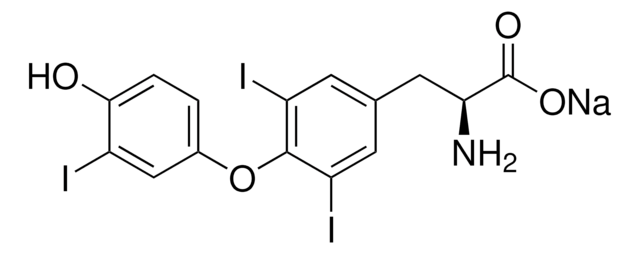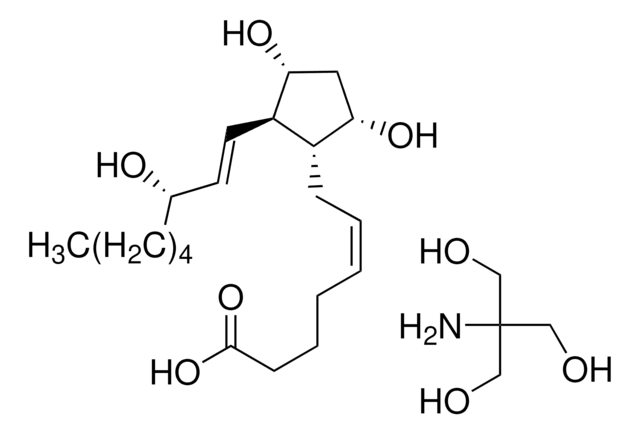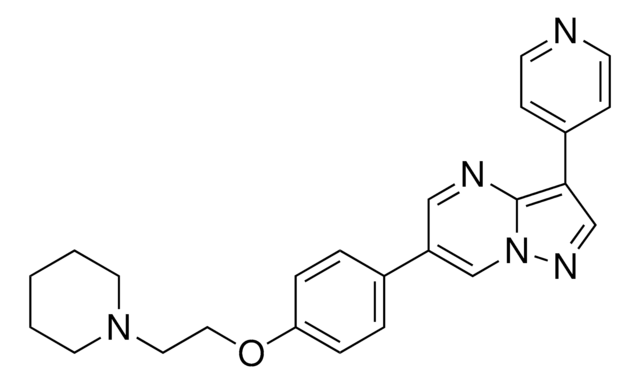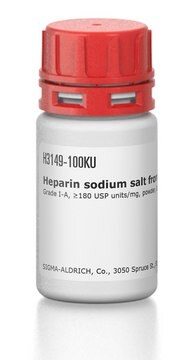GF164
ANG-1 Protein, Human Recombinant
The Ang-1 protein & Ang-2 protein are secreted ligands which bind with similar affinity to Tie2, a receptor tyrosine kinase with immunoglobulin & epidermal growth factor homology domains expressed on endothelial & early hematopoietic cells.
Sinónimos:
ANG1, Angiopoietin1, Hepatic fibrinogen/angiopoietin-related protein, PPARG angiopoietin related protein, angiopoietin-like 4, angiopoietin-like 4 protein, angiopoietin-related protein 4
Iniciar sesiónpara Ver la Fijación de precios por contrato y de la organización
About This Item
UNSPSC Code:
12352202
eCl@ss:
32160405
Productos recomendados
Categorías relacionadas
General description
Angiopoietin1 (Ang1) and Angiopoietin2 (Ang2) are two closely related secreted ligands which bind with similar affinity to Tie2,
a receptor tyrosine kinase with immunoglobulin and epidermal growth factor homology domains expressed primarily on endothelial cells and early hematopoietic cells. Tie2 and angiopoietins have been shown to play critical roles in embryogenic angiogenesis and in maintaining the integrity of the adult vasculature. Ang-1/Tie-2 signaling appears to be regulated by Angiopoietin-2 (Ang-2), a natural antagonist for Tie-2 that exerts its effects through an internal autocrine loop mechanism. In addition to suppressing endothelial cell activation by inhibiting the expression of adhesion and inflammatory molecules, Ang-1 enhances endothelial cell survival and capillary morphogenesis, and lessens capillary permeability. As such, Ang-1 has a potential to become an effective therapeutic agent for treating various endothelium disorders, including several severe human pulmonary diseases. Recombinant human ANG-1, derived from HeLa cells, is a C-terminal histidine tagged glycoprotein which migrates with an apparent molecular mass of 60.0 – 70.0 kDa by SDS-PAGE under reducing conditions. Sequencing analysis shows N-terminal sequences starting with Ser-20 and with Asp-70 of the 498 amino acid precursor protein.
a receptor tyrosine kinase with immunoglobulin and epidermal growth factor homology domains expressed primarily on endothelial cells and early hematopoietic cells. Tie2 and angiopoietins have been shown to play critical roles in embryogenic angiogenesis and in maintaining the integrity of the adult vasculature. Ang-1/Tie-2 signaling appears to be regulated by Angiopoietin-2 (Ang-2), a natural antagonist for Tie-2 that exerts its effects through an internal autocrine loop mechanism. In addition to suppressing endothelial cell activation by inhibiting the expression of adhesion and inflammatory molecules, Ang-1 enhances endothelial cell survival and capillary morphogenesis, and lessens capillary permeability. As such, Ang-1 has a potential to become an effective therapeutic agent for treating various endothelium disorders, including several severe human pulmonary diseases. Recombinant human ANG-1, derived from HeLa cells, is a C-terminal histidine tagged glycoprotein which migrates with an apparent molecular mass of 60.0 – 70.0 kDa by SDS-PAGE under reducing conditions. Sequencing analysis shows N-terminal sequences starting with Ser-20 and with Asp-70 of the 498 amino acid precursor protein.
Product Source: Hela Cells
Specificity
Cross Reactivty
None
None
Application
Research Category
Stem Cell Research
Stem Cell Research
Research Sub Category
Growth Factors & Receptors
Growth Factors & Receptors
Quality
Bioactivity assay: Determined by its ability to induce adhesion of human umbilical vein endothelial cells (HUVEC).
Physical form
Product is filtered through a 0.2 micron filter before lyophilization.
Storage and Stability
Store at -20°C for up to 6 months from date of receipt.
Disclaimer
Unless otherwise stated in our catalog or other company documentation accompanying the product(s), our products are intended for research use only and are not to be used for any other purpose, which includes but is not limited to, unauthorized commercial uses, in vitro diagnostic uses, ex vivo or in vivo therapeutic uses or any type of consumption or application to humans or animals.
Storage Class
11 - Combustible Solids
wgk_germany
WGK 3
Certificados de análisis (COA)
Busque Certificados de análisis (COA) introduciendo el número de lote del producto. Los números de lote se encuentran en la etiqueta del producto después de las palabras «Lot» o «Batch»
¿Ya tiene este producto?
Encuentre la documentación para los productos que ha comprado recientemente en la Biblioteca de documentos.
Nuestro equipo de científicos tiene experiencia en todas las áreas de investigación: Ciencias de la vida, Ciencia de los materiales, Síntesis química, Cromatografía, Analítica y muchas otras.
Póngase en contacto con el Servicio técnico






